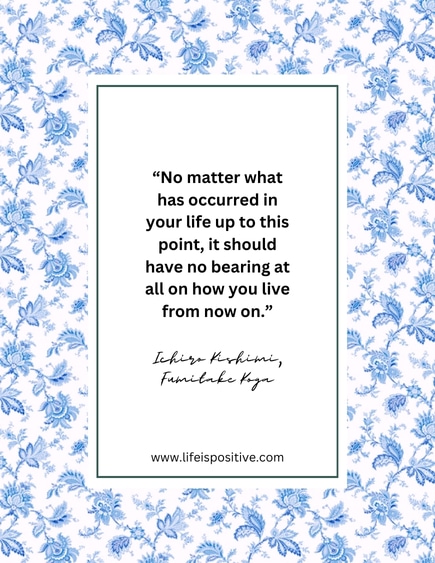|
Getting your Trinity Audio player ready...
|
On my bedroom wall, there’s a bright yellow notepaper featuring a quote from the Hungarian novelist George Konrad.
It encourages me to prioritize living life over building a career, seeking refuge in good taste, and assuring that the richness of a lived life compensates for inevitable losses.
Now, this isn’t your typical motivational cat poster or a coffee mug with a well-worn Beckett quote. It’s my daily reminder to embrace the adventure of life.
In a world captivated by the $10-billion self-improvement industry, simple quotes and feel-good stories no longer cut it. We crave a comprehensive system, and that’s where Ichiro Kishimi and Fumitake Koga’s “The Courage to be Disliked” comes in.
Hailed as a “Japanese phenomenon” with over 3.5 million copies sold in Asia, it’s not just a book – it’s a Trojan horse carrying transformative ideas. This isn’t your typical motivation; it’s a journey through the complexities of modern life.
Join me as we explore the secrets within this Japanese gem and understand why embracing the courage to be disliked might just be the key to unlocking genuine happiness.
Let’s delve into this unconventional wisdom and discover our path to a truly fulfilling life!
1. Breaking Free from the Popularity Trap
Kishimi and Koga, the dynamic duo behind this literary gem, serve up a refreshing cocktail of Adlerian psychology and Socratic dialogue.
The result? A book that’s not just a read but an enlightening journey into the liberating realm of self-discovery.
Picture this: You’re at a party, and someone asks, “What’s the book about?”
Well, it’s not your typical self-help manual. Instead, it’s a conversation between a philosopher and a young man exploring the tenets of Adlerian psychology.
It’s like eavesdropping on a life-changing tête-à-tête – without the awkward stares.
Alfred Adler is highly recognized and influential in the field of psychology. His brainchild, the Adlerian approach, isn’t just a psychological whisper; it’s a roaring testament to individual psychology.
Scholars and practitioners are nodding in agreement – Adler’s ideas are the secret sauce in the psychology mix!
2. Courage, Coffee, and Comfort Zones
The central theme revolves around the courage to embrace your own path, even if it means being disliked. Sounds easier said than done, right?
Well, the authors sprinkle a dash of humor and wit that makes this philosophical rollercoaster a joyride.
The book argues that seeking approval is a hamster wheel we’ve all been running on for too long. Imagine breaking free from that exhausting cycle.
Liberating, isn’t it? It’s like trading in your cramped cubicle for a corner office with a view – a view of your authentic, unapologetic self.
Read: How To Deal With People Who Dislike You
3. A Symphony of Ideas
One of the book’s strengths lies in its presentation. Instead of the usual sermon-style self-help book, “The Courage To Be Disliked” unfolds as a series of conversations.
It’s like attending a philosophy TED Talk where you’re not just a passive observer but an active participant.
The authors challenge popular beliefs, offering a symphony of ideas that’ll make your mental gears turn.
It’s like shaking a snow globe – your thoughts might be a bit scattered at first, but as they settle, you gain clarity on the life you truly desire.
Unlocking the Toolbox of Adlerian Wisdom
Now, let’s delve into the treasure trove of Adlerian principles that “The Courage To Be Disliked” unfolds.
It’s like getting the keys to a secret toolbox – a toolbox that’s been hiding in plain sight, just waiting for you to unlock its potential.
1. Goal-Oriented Living: The North Star of Happiness
One of the jewels in this philosophical treasure is the concept of Gemeinschaftsgefühl – a mouthful, I know, but bear with me. It’s the idea of social interest or community feeling.
Picture it as your compass guiding you toward a life filled with purpose and connection. Suddenly, the pursuit of happiness becomes less about selfies and more about contributing to the greater good.
The authors challenge the notion that our past dictates our present. Sure, we all have a backstory, but the power lies in how we interpret and use it.
It’s like turning a stumbling block into a stepping stone – a mental karate kick that’s as empowering as it sounds.
2. Taking the Driver’s Seat: The Fiction of Finalism
Ever felt like life’s steering wheel is in someone else’s hands? Kishimi and Koga give you a crash course in fictional finalism – the idea that we each have our own fictional goals driving our actions.
It’s like realizing you’re not just a passenger but the captain of your destiny. Who knew philosophy could be so liberating?
3. Courageous Conversations: Navigating the Sea of Relationships
The book doesn’t just stop at empowering individualism. It extends its helping hand into the realm of relationships. It’s like a guidebook for decoding the intricate dance of human connections.
The authors argue that our interpersonal dynamics are more like a dance than a chess game. So, lace up your dancing shoes and waltz your way to more meaningful connections.
Read: Top 10 Growth Ideas for Yourself at Work
Applying the Wisdom in Real Life
Now that we’ve uncovered the philosophical treasures within “The Courage To Be Disliked,” let’s talk about applying these nuggets of wisdom to the real world.
After all, what good is knowledge if it remains trapped between the pages?
1. Embrace Your Uniqueness
Imagine a world where authenticity is the currency, and fitting in is so last season.
The book encourages you to ditch the cookie-cutter mold and embrace the quirks that make you, well, you.
It’s like trading in your black-and-white TV for a Technicolor life.
So, go ahead and flaunt your uniqueness – it’s your superpower.
2. The Liberation of Letting Go
If seeking approval were a sport, many of us would be Olympic champions.
“The Courage To Be Disliked” challenges the notion that popularity is the ultimate prize.
It’s like a detox for your soul, releasing you from the shackles of external validation.
Picture it as a mental KonMari method – decluttering your mind from unnecessary approval-seeking baggage.
3. Conquering Conflict with Compassion
The book’s wisdom extends into the realm of relationships, offering a revolutionary perspective on conflicts.
It’s not about winning or losing, but understanding and connecting.
It’s like upgrading your relationship toolkit from a hammer to a Swiss army knife – versatile, effective, and surprisingly practical.
4. Your Life, Your Script
Ever felt like life handed you a script you didn’t sign up for?
“The Courage To Be Disliked” hands you a pen and says, “You’re the author now.”
It’s a call to rewrite your narrative with intention, purpose, and a touch of rebellious flair.
So, grab that pen and start drafting the chapters of a life you’ll be proud to call your own.
Final Thoughts: The Courage To Be Disliked
The Courage To Be Disliked isn’t just a book review; it’s an invitation to embark on a transformative journey. It’s not a one-time read but a companion in your quest for fearless living.
So, dear readers, let this be more than just a post. Let it be a catalyst for change, a spark that ignites the flame of courage within you.
Whether you’re sipping coffee in your favorite bookstore or scrolling through the virtual aisles of an online platform, make sure to add this gem to your reading list.
In a world that often values conformity over courage, let’s raise a virtual toast to the courage to be disliked. Here’s to embracing your uniqueness, letting go of approval, and rewriting the script of your life with intention.
May your journey be as bold, vibrant, and extraordinary as the philosophy that inspired it. Happy reading and even happier living!
For more empowering content, connect with our vibrant community here ➡️ Social Media.




